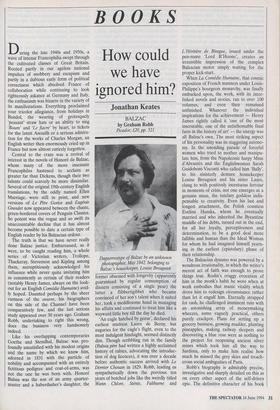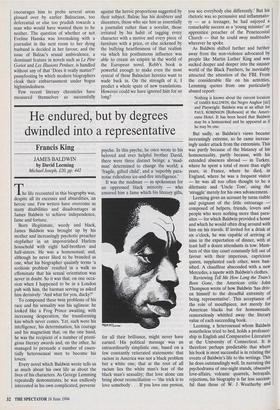BOOKS
How could we have ignored him?
Jonathan Keates
BALZAC by Graham Robb Picador, £20, pp. 521 by Graham Robb Picador, £20, pp. 521 During the late 1940s and 1950s, a wave of intense Francophilia swept through the cultivated classes of Great Britain. Rooted partly in our ageless national impulses of snobbery and escapism and partly in a dubious early form of political correctness which absolved France of collaboration while continuing to look righteously askance at Germany and Italy, the enthusiasm was bizarre in the variety of its manifestations. Everything proclaimed your tricolor allegiance, from holidays in Bandol, the wearing of grotesquely `peasant' straw hats or an ability to sing `Bourn' and 'Le fiacre' by heart, to tickets for the latest Anouilh or a serious admira- tion for the works of Charles Morgan, an English writer then enormously cried up in France but now almost entirely forgotten.
Central to the craze was a revival of interest in the novels of Honore de Balzac, whom many of the more insensate Francophiles hastened to acclaim as greater far than Dickens, though their two talents could scarcely be more dissimilar. Several of the original 19th-century English translations, by the oddly named Ellen Marriage, were still in print, and new versions of Le Pere Goriot and Eugenie Grandet now appeared between the chaste, green-bordered covers of Penguin Classics. So potent was the vogue and so swift its unaccountable decline that it has almost become possible to date a certain type of English reader by his Balzacian ardour.
The truth is that we have never really done Balzac justice. Embarrassed, as it were, to be caught reading him, a whole series of Victorian writers, Trollope, Thackeray, Stevenson and Kipling among them, surreptitiously acknowledged his influence while never quite imitating him as consistently as certain of their readers (notably Henry James, always on the look- out for an English Comedie Humaine) avid- ly hoped. Daunted perhaps by the sheer vastness of the oeuvre, his biographers on this side of the Channel have been comparatively few, and the last serious study appeared over 30 years ago. Graham Robb, undertaking to right this wrong, does the business very handsomely indeed.
Like his overlapping contemporaries Goethe and Stendhal, Balzac was pro- foundly unsatisfied with his modest origins and the name by which we know him, adorned in 1831 with the particle of nobility and accompanied with an entirely fictitious pedigree and coat-of-arms, was not the one he was born with. Honore Balssa was the son of an army quarter- master and a haberdasher's daughter, the Daguerreotype of Balzac by an unknown photographer, May 1842, belonging to Balzac's housekeeper, Louise Breugniot former obsessed with longevity (apparently guaranteed by regular consumption of dinners consisting of a single pear) the latter a flibbertigibbet who became convinced of her son's talent when it suited her, took a meddlesome hand in managing his affairs and continued to treat him like a wayward little boy till the day he died. `An eagle hatched by geese', declared his earliest mistress Laure de Bemy, but auguries for the eagle's flight, even to the most indulgent hindsight, seemed distinctly dim. Though scribbling ran in the family (Balssa pere had written a highly acclaimed history of rabies, advocating the introduc- tion of dog licences), it was over a decade before authentic success arrived with Le Dernier Chouan in 1829. Robb, leading us sympathetically down the previous ten years of botched jobs like the weirdly titled Wann Chlore, Stenie, Falthurne and L'Heritiere de Birague, issued under the pen-name 'Lord R'Hoone', creates an irresistible impression of the complex Balzacian motor simply waiting for the proper kick-start.
When La Comedie Humaine, that cosmic exposition of French manners under Louis- Philippe's bourgeois monarchy, was finally embarked upon, the work, with its inter- linked novels and stories, ran to over 100 volumes, and even then remained unfinished. Whatever the individual inspirations for the achievement — Henry James rightly called it 'one of the most inscrutable, one of the unfathomable final facts in the history of art' — the energy was all Balzac's own. The most striking aspect of his personality was its staggering autono- my. In the unending parade of forceful women who tried to mother and manipu- late him, from the Napoleonic harpy Mme d'Abrantes and the Englishwoman Sarah Guidoboni-Visconti who called him 'Bally', to his sinisterly demure housekeeper Louise Breugniot and his sister Laure, clung to with positively incestuous fervour in moments of crisis, not one emerges as a genuine muse, the tutelary goddess indis- pensable to creativity. Even his last and longest attachment, the Polish countess Eveline Hanska, whom he eventually married and who inherited the Byzantine muddle of his debts, turned out in the end, for all her loyalty, perceptiveness and determination, to be a good deal more fallible and human than the Ideal Woman for whom he had imagined himself yearn- ing in the earliest (epistolary) phase of their relationship.
The Balzacian dynamo was powered by a wondrous irrationality, in which the writer's merest act of faith was enough to prove things true. Rodin's craggy evocation of him in the monk's habit he wore when at work embodies that manic vitality which drove him to redesign circumstance rather than let it engulf him. Eternally strapped for cash, he challenged imminent ruin with an astonishing array of moneymaking wheezes, some vaguely practical, others purely crackpot. Plans for setting up a grocery business, growing madder, planting pineapples, making railway sleepers and discovering a blue rose were as nothing to the project for reopening ancient silver mines which took him all the way to Sardinia, only to make him realise how much he missed the grey skies and treach- erous social ambiguities of Paris.
Robb's biography is admirably precise, investigative and sharply detailed on this as on every other aspect of the self-driven epic. The definitive character of his book encourages him to probe several areas glossed over by earlier Balzacians, too deferential or else too prudish towards a man who would have wanted them to be neither. The question of whether or not Eveline Hanska was lovemaking with a journalist in the next room to her dying husband is decided in her favour, and the issue of Balzac's sexual ambivalence, a dominant feature in novels such as Le Pere Goriot and Les Illusions Perdues, is handled without any of that 'Does it really matter?' pussyfooting by which modern biographers cloak their embarrassment under bogus highmindedness.
Few recent literary chronicles have measured themselves so successfully against the heroic proportions suggested by their subject. Balzac has his doubters and dissenters, those who see him as essentially a journalist rather than a novelist, those irritated by his habit of tagging every character with a motive and every piece of furniture with a price, or else sickened by the bullying heartlessness of that realism via which his posthumous influence was able to create an empire in the world of the European novel. Robb's book is powerful enough to make even the most cynical of these Balzacian heretics want to wade back in. On the strength of it, I predict a whole spate of new translations. However could we have ignored him for so long?



























































 Previous page
Previous page